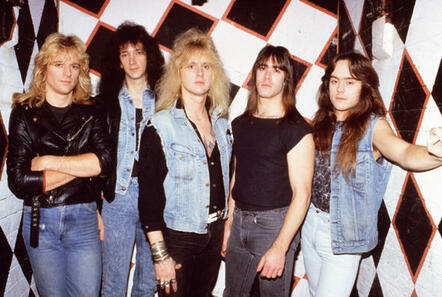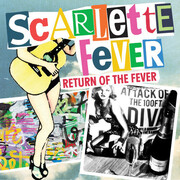New York, NY (Top40 Charts/ Roadrunner Records) One of Roadrunner's most important early releases turns 25 this week. Canadian thrash legends Annihilator's debut album, Alice in Hell, was released April 17, 1989. An absolutely blazing album filled with wild guitar shredding, intricate and progressive song structures, and big doses of arena-sized melody, Alice was a unique outlier on the thrash landscape, all the more so for being the product of one relatively isolated semi-madman from the wilds of Western Canada - guitarist Jeff Waters.
In some ways a pumped-up demo, produced by Waters, the album was nevertheless one of Roadrunner's most popular releases at the time, selling over 250,000 copies worldwide. First introduced to Roadrunner A&R guru Monte Conner through the demo tape-trading circuit, Annihilator were one of the first bands he signed upon joining the label. Let's let Monte pick up the story himself:
"While attending Baruch College in NY from 1982-1987, I hosted a weekly one hour show called The Witching Hour at the college radio station, WBMB 590 AM. I played the latest underground metal from all the cool indie metal labels as well as demos of all the emerging, cutting-edge, unsigned bands of the day—bands like Metallica, Anthrax, Exodus, Overkill, Megadeth, Possessed, Mantas/Death, Sodom, Destruction, etc.
I wanted to get free albums for my show, so I would keep in touch with Combat, Metal Blade, Roadrunner and all the cool metal labels at the time. I would also send my favorite demos to my contacts at these labels. In fact, I was the first person here in the U.S. to champion the band Annihilator—I sent their Phantasmagoria demo to all the labels I was in touch with. I did this not just to help out the band, but to help myself establish relationships and get my foot further in the door with these labels. When I graduated college in January 1987, I called everyone I knew at these labels and begged for a job.
"One of the first things I did when I got hired at Roadrunner in December 1987 was to utilize the resources from my four and a half years at WBMB—all the unsigned bands I knew about. Unfortunately
Metallica had been signed back in 1983, and
Megadeth and
Testament and all these other big bands I knew about in their demo days were on their way with their careers at that stage. But there were quite a few from my WBMB days that were still unsigned. The two bands that I acted on almost immediately were Sepultura and Annihilator. By the time I signed Annihilator, I had known Jeff very closely for about two years."
We got Jeff Waters on the phone to talk about Annihilator's early days and more.
Annihilator was one of a small wave of thrash and speed metal bands to emerge from Canada in the early 80s, alongside Voivod and Exciter and a couple of others—who were you listening to at that time?
Razor, Anvil, Exciter, Voivod, and some smaller bands, too. It was great. Some of these, like Razor, Exciter, and Anvil, their first record or two were really influential.
Anvil had that movie later, and a career after the '80s, but the first records from those bands were really influential on everybody, from the Big Four to so many people, and the generation after that had no clue who those bands were. I was like 16, 18 years old, sneaking into clubs and watching those three bands. And then of course, Slayer, Metallica, Exodus, Anthrax, the Mike Varney Shrapnel [Records] compilations…that was a big turning point for me. I'd been a melodic heavy metal fan—Van Halen, Scorpions, AC/DC, Kiss, all that stuff—and as soon as that early '80s thrash wave hit, I was done; I was going over to the dark side.
You went through a lot of bandmembers in the band's first few years, before Alice In Hell was recorded. Why do you think there was so much turnover in those years?
What happened for me was, I was essentially a teenager into melodic heavy metal, and thrash comes along and bang, I'm really into it. I got started a little later—Alice in Hell came out when I was 23 years old, even though I'd been working on Annihilator stuff since I was 18. But I thought, I'm a guitar player, writing songs and playing solos—I need a singer. I need a drummer. I need a bass player. And I think what happened was, my vision was, like a lot of people that are in bands that are successful or still around, the main guy that's the driving force in the band, they're full-on. This is your life, you don't care about money, girls, booze, drugs, cigarettes, food, nothing, you're just focused on your dreams.
Everything is all about the next riff, or learning to be better at this, or learning the new
Van Halen solo, watching videos—VHS videos, back in the day. You really are a driving force, if you're like I am. So I found guys, but essentially what happened was, they were good-looking kids with long hair and they were more interested in going to the bars to drink, watch bands, and let everybody know they looked like a rock star, rather than actually sitting down and working on the songs and getting better as players in whatever they were doing. So I ended up writing and recording the bass for the demos, because I couldn't get the bass player away from his girlfriend, the singer wanted to be out partying, and I had limited people here in Ottawa, Canada to draw from. It's a very small city when it came to that kind of music. Metal was popular, but there was nobody around.
How did you get signed to Roadrunner? Did Monte come up to Canada to see you play, or was it strictly demo-in-the-mail?It's funny. I don't think I've ever told this story...before Roadrunner was interested—and Combat, and MCA, and all the labels that were going for us in the early days—Brian Slagel from Metal Blade made me an offer, sent me a contract to basically sell the song "Alice in Hell" to Lizzy Borden. I think the paycheck was $2000 US, and I remember asking my father, I was like, 'Dad, $2000,' which was like 200 grand to me, and I was gonna take the money. And he said, you don't do that. You keep your stuff, and if somebody's willing to offer you $2000, maybe someone else'll offer you 20. So I listened to him and the rest is history.
I knew Monte from WBMB, the station in Babylon, New York. It was a college radio station; he had a show and he would play all these cassette demos that had been dubbed a million times, from all over the world. Of course he would play the big stuff, but if you were living in that time, tape trading and fanzines were the biggest thing. There were demo tapes floating around, and the way you'd get interest would be to mail them to one of these fanzines that kids were printing with 20 pages of black and white photocopied reviews of CDs and demos from bands. You would wait months to get a response back in the mail, and maybe six months later you've got a review in a little 10-page photocopied fanzine. And Monte discovered me because he was looking for bands from around the world and heard our first demo and went, 'Whoa, this is cool.' He'd never seen us; remember, it was all done by the post. You'd run to your parents' mailbox every day to see if someone had reviewed your demo or just liked it. So when Monte finally got a job at Roadrunner, I think, if I got this right, we were first on his list. King Diamond was the only big band then, and I think we were his first signing.
What was Roadrunner's input into the album while it was being recorded?
I had a manager at the time who was just not the right guy, but he was there, and he would do the communications with the label. I think Monte was the only one who believed he had something with my band, and I think Cees Wessels, the boss, had basically said, 'Well, OK Monte, I'll trust you on this one.' Even my manager, I'm sure, had no clue that it was good stuff on this record. I don't think he gave two shits about the band. But the label was fantastic. I don't even remember any incidents that were negative with them, other than stuff with the manager and what he was doing with the video advance money and stuff like that. They keep you busy—put you on the road, and the manager gives you enough money to keep you drunk every night so you don't wonder what's going on with the business end—but I don't remember anything negative. They never had a lot of creative input. Monte was such a fan and knowledgeable about that stuff, so he and I would talk on the phone about riffs, which songs we liked, and I would listen to him and take his opinion on stuff.
You produced another Roadrunner release, Defiance's Product of Society, that same year—what do you remember about that?Monte called up and said, 'I like the production you do'—not necessarily the sound, because [Alice in Hell] was a demo and he understood that—'and we've got these bands we signed, so take your pick. Would you want to meet Sepultura in Florida, and produce them there'—and I'd never done this [for another band before], only Annihilator, and he was saying, I think you might have a career as a producer. So he said, 'Take your pick; there's this band called Sepultura, they don't really speak English that well,' which maybe the one or two guys from the band he'd been in contact with, their English wasn't as good as it obviously is now, after being world travelers for the last 25 years. He said, you can go to Scott Burns' studio down there, or he said, you can work with this San Francisco band who kinda sound like they want to be Exodus and
Testament and Metallica; do you want them to come up to Vancouver? I listened to demos by both bands, and I said, you know, I think that Defiance band's probably gonna do better, so I'll take them. It was one of those things I've laughed at my whole career, 'cause I've made some really dumb calls.
Stream Alice in Hell on Spotify:
Annihilator are still recording and touring the world; visit annihilatormetal.com for the latest updates on the band.
























